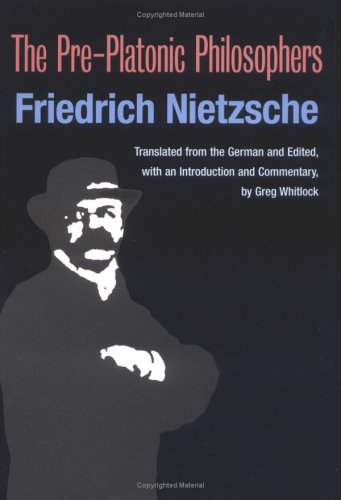International Nietzsche Studies
1 total work
This extraordinary document supplies to English-language readers a missing link in the chain of development of a preeminent nineteenth-century philosopher. "The Pre-Platonic Philosophers" reproduces the text of a lecture series delivered by the young Friedrich Nietzsche (then a philologist) at the University of Basel between 1872 and 1876. In these lectures, Nietzsche surveys the Greek philosophers from Thales to Socrates, establishing a new chronology for the progression of their natural scientific insights. Roughly formulating many of the themes he later developed at length, Nietzsche sketches concepts such as the will to power, eternal recurrence, and self-overcoming and links them to specific pre-Platonics. Greg Whitlock is the first scholar to have wrestled Nietzsche's difficult manuscript into English. This superbly readable translation, complete with Nietzsche's own extensive sidenotes and philological citations, is accompanied by a prologue, an introductory essay, commentary on the lectures, and voluminous bibliographical materials.
Whitlock's translation confirms that Nietzsche grouped Socrates with the earlier Greeks, rather than with Plato and other "mixed character philosophers" as many interpreters have claimed. That Nietzsche's philosophical sympathies lay with the pre-Platonics, as opposed to the pre-Socratics, bears substantially on his later rejection of absolutes such as Truth, Knowledge, Beauty, and Being. An overlooked major text of classical studies, "The Pre-Platonic Philosophers" is invaluable both as a record of Nietzsche's views on the early Greek thinkers and as a prefigurement of key aspects of his mature philosophy.
Whitlock's translation confirms that Nietzsche grouped Socrates with the earlier Greeks, rather than with Plato and other "mixed character philosophers" as many interpreters have claimed. That Nietzsche's philosophical sympathies lay with the pre-Platonics, as opposed to the pre-Socratics, bears substantially on his later rejection of absolutes such as Truth, Knowledge, Beauty, and Being. An overlooked major text of classical studies, "The Pre-Platonic Philosophers" is invaluable both as a record of Nietzsche's views on the early Greek thinkers and as a prefigurement of key aspects of his mature philosophy.
